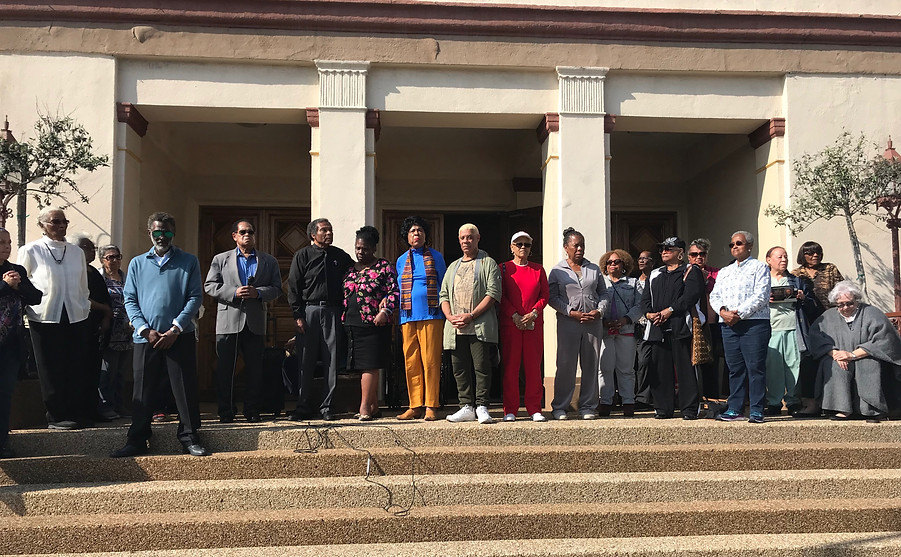
The Bell Still Tolls
Adjusting the pearls around her neck while smiling and gently shaking her head, she sighed, “Oh, Uncle Martin.” Donzaleigh Abernathy, Martin Luther King Jr.’s youngest goddaughter reminisced on her memories of one of the nation’s strongest, most impactful leaders. But as a young girl, Abernathy said MLK was not just a civil rights activist. To her, he was hysterically funny, supportive and kind.
“I feel privileged because he was mine. When he walked into a room, he lit it up,” she remembered. “When he would speak, he would make the hair stand up on your arms.”
The world has been without MLK for 50 years now, but his love lives on through family, religion and legacy. Abernathy, one of the few surviving members of the Abernathy and King family, said she feels a responsibility and duty to tell stories of how she remembers her father, Ralph Abernathy and her godfather, MLK—leaders of the civil rights movement of the ‘60s. Like many around the world, she holds her father and MLK on a high pedestal.
“We were in awe of our fathers,” she said.

Speaking Out: Abernathy discusses childhood memories of MLK, her godfather.
Abernathy shared her unique perspective of these two leaders with a USC journalism class recently. King was the cool uncle who let the children jump on the bed in the evening as he composed serious rhetoric about segregation for the next day’s sermon.
Abernathy was raised around Freedom Fighters. She marched with her father, MLK and thousands of Americans who pushed for equal liberties. She grew up knowing what it meant to be a part of a civil rights movement. It was not a glamorous job, but she admired it. Her father and MLK, two twenty-somethings with a dream, stayed up many nights outlining the next steps for the movement. They were even arrested multiple times.
“[MLK] used to say a courageous [person] is someone who’s afraid but goes forward, even though they are afraid,” she said.
Abernathy saw the positive impacts of nonviolence in the civil rights fight. Her father and MLK engrained it into her mind. She explained that nonviolent defiance appeals to the social consciousness of the oppressor.
“It didn’t start out as a non-violent movement. We just wanted respect,” she said. “It takes strength to love.”
Abernathy said today’s civil rights and justice movements are mirror images of the campaign her godfather led. Fifty years later, people are still using MLK’s methods and determination to fight new battles. She attributed the success of the 1960s civil rights movement and the current March for Our Lives movement to children and young adults.
“It was the young people who answered the call,” she said. “The way [school students] are being attacked is the same way young people were being attacked in the ’60s.”
Rev. Cecil “Chip” Murray is the current John R. Tansey Chair of Christian Ethics and senior fellow in the School of Religion at the University of Southern California. Murray, a retired pastor of the First African Methodist Episcopal Church of Los Angeles, served for 27 years. He said the civil rights movements of the 1960s had seriously deep impacts on the nation’s institutional beliefs.
“The civil rights acts, particularly of the 1960s, were major alterations of the structure of America, the mentality of America and in the setting free of all America because we had a long history of segregation and separation,” he said in his office.
While there has been progress for diverse communities in this country, there are still many issues when it comes to race relations and equality, Murray explained.
“When we look at segregation and civil rights, we still have quite a way to go,” he said. There are still those who talk about the post-civil rights movement like it’s over, we all got freedom and [they] don’t want to hear any more complaints.”
Mark Race, Dean of the Church of the Transfiguration in Leimert Park, is holding on to hope that the movement has not ended. On April 4, the anniversary of MLK’s assassination, the church bells tolled 39 times at 4:01 p.m. in honor of each year of MLK’s life. Race delivered a speech to those congregated.
“Somewhere out there, there’s another Martin Luther King. We need you. We need leaders who are willing to do the right thing. We need leaders who are willing to give their lives to help others and ask nothing in return. We need leaders who are going to go call all people together regardless of their background,” Race said. “Step up so we can say again ‘free at last, free at last. Thank God almighty we are free at last.’”
At the conclusion of the service, attendees linked arms and sang a civil rights anthem,
“We shall overcome/We shall overcome/We shall overcome someday/Oh deep in my heart/I do believe/We shall overcome someday.”
Spencer Petty also contributed to this story.








